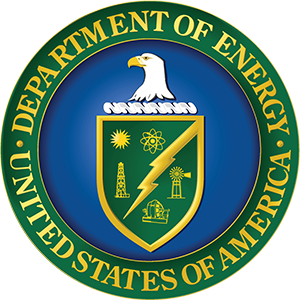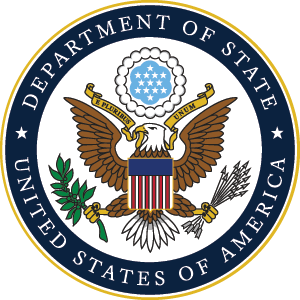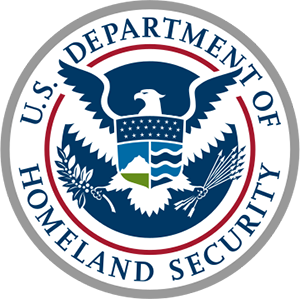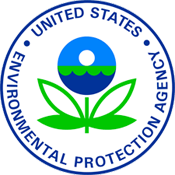Introduction
Within This Page
ESG is a growing movement that helps define and assess the impacts of businesses and companies on Environmental, Social, and Governance issues. While the concepts of ESG have existed for a long time, partly arising from the sustainability movement of the 1980s, the term ESG was officially coined in 2005. It was the result of the report "Who Cares WinsDownload who_cares_wins_global_compact_2004.pdf," which was published by the United Nations and was originally intended to focus on investments. The report demonstrated that incorporating ESG factors into financial analysis and decision-making would more quickly lead to sustainable markets and better outcomes for society overall. The Paris Agreement, an international treaty on climate change that seeks to limit the Earth's temperature increase to 1.5°C above pre-industrial levels, has also shaped much of the environmental focus of ESG since. ESG has continued to grow exponentially as government, businesses, and consumers have become more conscious of the need to address how actions and operations affect society and the environment.
ESG has also become far more significant than just a tool for investors. Approximately 90% of ESG regulations are now the responsibility of government agencies. Other groups such as financial regulators, central banks, industries, and statutory bodies also play a role in regulating ESG. The regulations and regulating practices also vary by country. With the increased focus on climate change, carbon emissions reduction requirements, and nature-positive development and investments, ESG is set to grow even further and become more standardized and transparent in the coming years. Companies, businesses, and organizations will need to understand and incorporate ESG policies into their operations and business practices, given the rapidly expanding importance and more stringent requirements of ESG around the world. A brief overview of ESG issues, policy development, and some of the proven benefits, along with links to additional resources for planning, implementing, and reporting ESG are provided in this page.
Description
Defining ESG
As companies, organizations, consumers, and investors are seeking more accountability and transparency around the three main focus areas of ESG: Environmental, Social, and Governance issues, it is important that a set of ESG policies are developed to ensure that specific requirements are met. A thorough review and analysis of the company or business operations, assets, supply chains, shareholders and stakeholders, and how they align with their business objectives and sustainability goals are essential. The process should be inclusive and engage employees, customers, communities, and others closely involved with the company or organization. ESG can be implemented in small, medium, and large size businesses, companies, and organizations and is often a way to attract socially and environmentally conscious investors, consumers, and customers. It is also an opportunity to get creative and find new solutions to both internal and external problems and issues while also ensuring long-term success and growth.
Environmental
The environmental aspects of ESG are focused on improving the environmental performance of a business or company. For example, this may include reducing direct and indirect greenhouse gas emissions, increasing resource efficiency, implementing recycling practices, emergency preparedness, understanding and reducing climate risks, increasing the use of renewable energy, water and waste management strategies, complying with other environmental regulations, and even animal treatment.

Analyzing the impacts of the buildings and operations of a business can lead to major improvements and retrofits to meet ESG goals. Photo Credit: U.S. EPA
Social
The social aspects of ESG focus on a business or company's impact on its employees, customers, suppliers, and the local community. Issues such as workplace conditions and employee health and well-being, and safety should be addressed in the ESG policies. Ethical treatment of employees and other organizations and companies that they are associated with should be considered. Supporting the local and surrounding community through donations, services, or volunteer work should also be considered in this category. Supporting the local economy, local infrastructure, and encouraging education and training events can also be included. Policies that support diversity, inclusion, equity, and social justice are also ways to fight against racial, gender, and sexual discrimination.

Planning for diversity, equity, and inclusion results in a much more engaging and collaborative environment, often solving challenges in new and creative ways. Photo Credit: Wikimedia Commons/University of Michigan, School for Environment and Sustainability
Governance
ESG governance standards help to ensure that a business or company uses accurate and transparent accounting and reporting methods, pursues integrity and diversity in selecting its leadership, including its board of directors, and is accountable to all its shareholders or stakeholders. It is also a way to ensure that a company is not engaging in risky or unethical business practices such as not adhering to zoning laws, having outstanding lawsuits, or is in conflict of interest with authorities or other parties. Additional concerns include the management structure, employee relations and retention, and salaries and compensation.
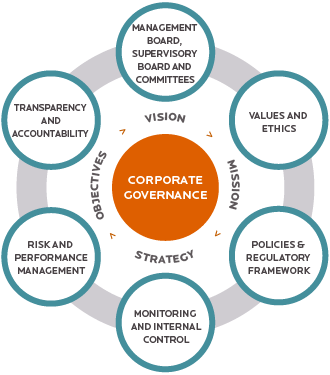
An example of corporate governance framework issues to address.
Image credit: Wikimedia/Creative Commons
Application
Developing ESG Policies
ESG policies should include very clear and specific objectives and targets. This will ensure that the policies are implemented accurately and effectively. These objectives and targets should also be quantifiable and aligned with a company or organization's larger mission, vision statement, and business plan. For example, if a company is planning to reduce its greenhouse gas emissions by 35% by the year 2030, they must explain how they will do that, how they will measure it, and be able to prove that they are meeting the goal. The policies should be developed with input and participation by employees, stakeholders, and shareholders, and must be transparent and attainable in order to be effective. Polices will need to be reviewed and modified as situations, values, and circumstances change and as new tools, technologies, and opportunities arise.
Reporting of ESG measures and plans requires analyzing specific forms of data in order to create an ESG rating or ESG score. This information is used by investment analysts to determine their effectiveness and accuracy, which will then in turn determine whether or not a business or company can become engaged with a proposed business, project, or investment. Carbon accounting software is a significant part of reporting, since carbon emissions reduction and/or carbon neutrality are important aspects of the environmental issue of ESG. For example, to create a complete and accurate picture of the emissions, it is important that the report includes the source and measurements of current impacts, specific activities or measures to reduce or offset carbon emissions, and how this is certified.
There are a number of ESG reporting frameworks due to the variety of companies that are participating in this type of reporting. There are also such a wide range of industries that have different types of ESG impacts and aspects, so the reporting frameworks need to be able to report on different types of metrics. Additionally, different types of stakeholders such as investors, regulators, and even consumers often want to be able to review various types of information. Each of the ESG reporting frameworks will have their own type of metrics, methodology, and scoring system. This can make it difficult to compare information. So, it is important to have a good understanding of how the information is collected, analyzed, and presented in order to interpret it correctly. The most popular ESG reporting frameworks include standards developed by the Carbon Disclosure Project, Climate Disclosure Standards Board, Global Reporting Initiative, International Integrated Reporting CouncilDownload InternationalIntegratedReportingFramework.pdf , and the Sustainability Accounting Standards Board.
Benefits of ESG
Today, businesses and organizations that have robust ESG policies tend to gain consumers and investors that also value sustainability and ethical behavior and decision-making practices. When ESG issues are prioritized, it is also possible to reduce risks and cultivate better relationships with investors, employees, and other organizations, businesses, and companies that are in alignment with these values. Additionally, investors now prefer, and in many cases are required, to support only socially and environmentally responsible businesses, companies, and organizations. With the increased focus on addressing climate change, more businesses, companies, and organizations will need to be a part of the solution, especially since any business activity, product, or project that is carbon intensive is now considered high risk.
ESG policies show a commitment to doing more than just generating a profit and to demonstrating values that have a positive impact on people and the planet. ESG policies also help reduce operating costs and increase employee engagement and satisfaction. They can also improve the financial standing and performance as well as the reputation of a business or company over the long-term.

Solar energy and wind power are among the many forms of renewable energy sources that can be implemented to meet ESG goals such as reducing carbon emissions. Photo Credits, Left to Right: NREL.gov and DOE.gov.
Related Issues
ESG can also align with and support larger initiatives such as the U.N.'s Sustainable Development goals, LEED, Living Future Challenge, and other green-rated building projects, Zero Net Carbon Buildings, the Fair Housing Act, and many other strategies, investments, and markets that are engaged in creating a more sustainable, resilient, inclusive, and just future for all.
For example, if a building is designed to meet LEED or other green building rating system requirements, ensuring that it performs as intended, can directly tie to the organizations and companies who own or lease the building or spaces through the ESG policies. In another case, for a residential real estate investor it may be detrimental to the approval and funding of a housing project if it is not meeting LEED requirements, addressing fair housing laws, or located near good schools. It is important to also consider ESG before acquiring an existing building to better understand and plan for the eventual transition that may entail upgrades, retrofits, and other strategies that are necessary to bring the property into alignment with ESG.
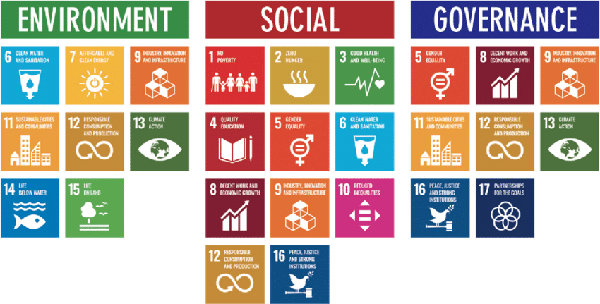
ESG through the lens of the U.N.'s Sustainable Development Goals Image Credit: United Nations
Emerging Issues
As ESG continues to grow and become more ingrained into business, investing, and the economy, there will be a need to look at the issues more holistically. This means that all of the potential impacts that a company or organization has on the world around them will need to be considered and addressed. This will also entail creating a culture within the business or organization that is committed to the ESG goals and where everyone feels a sense of responsibility to the objectives. This may also require hiring and collaborating with new people that align with the mission and vision of the company or organization and the ESG goals.
Technology advancements and improved access to ESG-related data will only continue to further enhance the ability of investors to assess a business or company's ESG performance more accurately. As a result, development of more sophisticated ESG investment products and strategies, as well as an increasing integration of ESG goals into mainstream investment decision-making, are likely to happen in the near future.
Relevant Codes and Standards
- Fair Housing Act
- International Green Construction Code (IgCC) developed collaboratively by the International Code Council, the American Institute of Architects (AIA), ASHRAE, the US Green Building Council (USGBC), and the Illuminating Engineering Society (IES). 2021.
- Just Label, Program of the International Living Future Institute
- Living Future Challenge, Program of the International Living Future Institute
- LEED Rating System, Program of the U.S. Green Building Council
- National Preparedness, Program of FEMA
- U.N. Sustainable Development Goals
Additional Resources
Organizations And Associations
- Carbon Disclosure Project
- Climate Disclosure Standards Board
- EPA Center for Corporate Climate Leadership
- Global Reporting Initiative (GRI)
- International Integrated Reporting Council
- International Sustainability Standards Board (ISSB)
- Science Based Targets Initiative (SBTi)
- Sustainability Accounting Standards Board (SASB)
References
- Who Cares Wins: Connecting Financial Markets to a Changing World by the Swiss Federal Department of Foreign Affairs and the United Nations. 2004.
Tools
- Acquisitions Sustainability Toolkit by the Better Buildings Partnership
- Risk Management, Tools for Hazard Resilience, Program of FEMA



